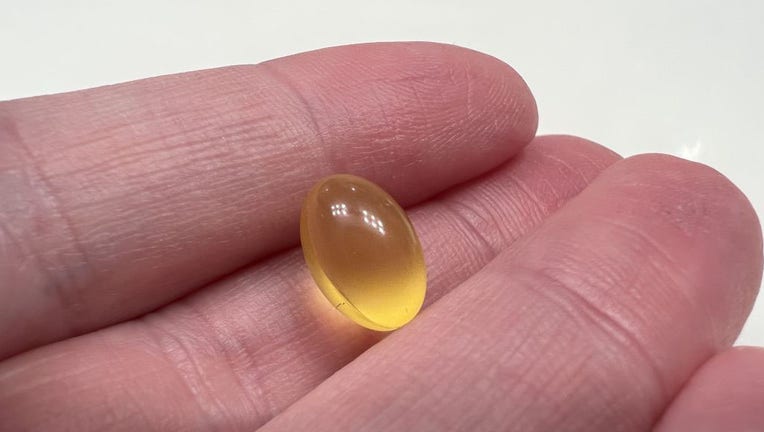Taking vitamin D could help prevent dementia, study suggests

A person's hand holds a small vitamin D supplement in a file image dated Jan. 4, 2022. (Photo by Smith Collection/Gado/Getty Images)
Taking vitamin D supplements could help prevent dementia, and perhaps even moreso in females, according to a new large study.
Vitamin D, which comes from sunlight and foods like salmon, red meat, and egg yolks, is a nutrient the body needs for building and maintaining healthy bones.
Vitamin D is involved in the clearance of amyloid in the brain, the accumulation of which is one of the hallmarks of Alzheimer’s disease, and previous research has found that low levels of vitamin D are linked to higher risk of dementia.
Studies have also found that the nutrient may provide help to protect the brain against build-up of tau, another protein involved in the development of dementia.

5 healthy lifestyle habits identified as lowering Alzheimer's risk
A combination of physical activity, not smoking, light alcohol consumption, a good diet and cognitive activities may help lower the risk of the disease by as much as 60 percent, a study found.
In a new study, published Wednesday in Alzheimer's & Dementia: Diagnosis, Assessment & Disease Monitoring, researchers at the University of Calgary’s Hotchkiss Brain Institute in Canada and the University of Exeter in the U.K. found that taking vitamin D was associated with living dementia-free for longer. They also found 40% fewer dementia diagnoses in the group who took vitamin D supplements.
The study involved more than 12,388 participants of the U.S. National Alzheimer's Coordinating Center, who had an average age of 71 and were dementia-free when they signed up, according to the researchers. Of the participants, 37% (4,637) took vitamin D supplements.
The researchers noted that a total of 2,696 participants progressed to dementia over 10 years. Among this group, 2,017 (75%) had no exposure to vitamin D throughout all visits prior to the dementia diagnosis, and 679 (25%) had a "baseline exposure."
While vitamin D was found to be effective in all groups, the team noted how the effects were significantly greater in females, compared to males.
Furthermore, the effects of vitamin D supplementation were greater in people with normal cognition, compared to those who reported signs of "mild cognitive impairment," or changes to one’s cognition which have been linked to a higher risk of dementia.
"Our findings give key insights into groups who might be specifically targeted for vitamin D supplementation," Professor Zahinoor Ismail, of the University of Calgary and University of Exeter, who led the research, said in a statement. "Overall, we found evidence to suggest that earlier supplementation might be particularly beneficial, before the onset of cognitive decline."
RELATED: New Alzheimer's drug: What to know as Leqembi hits the market
The effects of vitamin D were also found to be significantly greater in people who did not carry the APOEe4 gene, which is known to present a higher risk for Alzheimer’s dementia, compared to non-carriers.
About 25% of people carry one copy of APOE4, and 2% to 3% carry two copies, according to the National Institutes of Health. While APOE4 is the strongest risk factor gene for Alzheimer’s, inheriting it does not mean a person will definitely develop the disease.
The study authors suggested that people who carry the APOEe4 gene may absorb vitamin D better from their intestine, which might reduce the need and effect of supplementing with vitamin D. However, the team did not draw the participants’ blood levels to test this hypothesis.

Excessive daytime napping could be early indicator of Alzheimer?s disease, study says
Alzheimer?s disease attacks brain regions responsible for wakefulness during the day, the researchers found, adding that wakefulness-promoting neurons in these regions are among the first to be damaged by the disease.
Alzheimer’s disease is the most common type of dementia. Current estimates indicate that about 5.8 million people in the U.S. have Alzheimer’s disease and related dementias, including 5.6 million aged 65 and older, the U.S. Centers for Disease Control and Prevention states.
The study authors also noted several limitations, including how medication sheets used by the National Alzheimer's Coordinating Center did not record information about exposure history, and therefore differences in exposure duration were also not accounted for. Additionally, because dosing and baseline vitamin D levels were not available – it was unknown whether the rates of dementia differed based on doses or vitamin D deficiency, the researchers added.
"Preventing dementia or even delaying its onset is vitally important given the growing numbers of people affected," study co-author Dr Byron Creese from the University of Exeter said in a statement. "The link with vitamin D in this study suggests that taking vitamin D supplements may be beneficial in preventing or delaying dementia, but we now need clinical trials to confirm whether this is really the case."
Creese noted the ongoing VitaMIND study at the University of Exeter, which is exploring this issue further by randomly assigning participants to either take vitamin D or a placebo – and examine changes in memory and thinking tests over time. That research is run by PROTECT, an online study open to people 40 and older.
RELATED: Scientists find signs of Alzheimer's in dolphin brains
This story was reported from Cincinnati.

